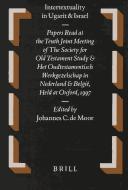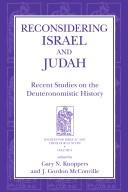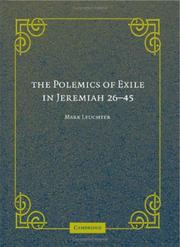| Listing 1 - 10 of 82 | << page >> |
Sort by
|
Book
ISBN: 3737013446 3847113445 Year: 2023 Publisher: Göttingen : V&R unipress,
Abstract | Keywords | Export | Availability | Bookmark
 Loading...
Loading...Choose an application
- Reference Manager
- EndNote
- RefWorks (Direct export to RefWorks)
The last kings of Juda led God's people directly into exile and thus in the catastrophe of the destruction of the First temple. How did that happen? Who was responsible? What kind of role did God play in this drama? These questions will be addressed by Benedikt Collinet. Unlike the narrative suggests, the kings were not the protagonists of the drama but the antagonists to God instead. God used the neighbouring peoples and Babel as tools of punishment. The reason for these punishments was the systemic covenant break of God's people. The consequences of these punishments can be read in Deuteronomy 28. The story is a composed deconstruction of divine salvation promises. The salvation gifts were withdrawn but the promises still remained. The people needed a new beginning that with reference to the exodus could only be indicated or prepared by pardoning Jehoiachin (2 Kings 25:27-30).

ISBN: 9004118713 9004494235 9789004118713 9789004494237 Year: 2000 Volume: 44 Publisher: Leiden, The Netherlands : Koninklijke Brill,
Abstract | Keywords | Export | Availability | Bookmark
 Loading...
Loading...Choose an application
- Reference Manager
- EndNote
- RefWorks (Direct export to RefWorks)
In the politico-religious history of the Deuteronomists, past, present and future mingle in an often inextricable way. Long obsolete traditions, which had been unacceptable to the Davidic dynasty, were rediscovered and adapted to the aims of the Deuteronomists. Personages of the past were condemned and blackened in the light of the new ideology, whereas others were glorified and embellished as heroes of faith because their ideas suited the historians. This inevitably raises the question whether the Bible can be trusted as a source book for writing a history of Israel. Apparently not, say scholars like T.L. Thompson, P.R. Davies and N.P. Lemche. In this volume a number of authors take up this challenge, stating that the radical rejection of the biblical testimony in favour of a history based mainly on archaeology is ill-advised. Several contributions to this volume draw instructive parallels between the process of re-writing the history of South Africa and the work of the Deuteronomists.
Deuteronomistic history (Biblical criticism) --- 222.4 --- 224 --- Deuteronomic history (Biblical criticism) --- Deuteronomists (Biblical criticism) --- DH (Biblical criticism) --- D document (Biblical criticism) --- Deuteronomium --- Profetische boeken van het Oude Testament --- Congresses --- Deuteronomistic history (Biblical criticism) - Congresses. --- Deuteronomist history (Biblical criticism) --- Prophet --- Prophets --- Biblical teaching --- Bible AT Deutéronome --- Prophètes --- Document D (critique biblique) --- Critique, interprétation, etc --- Enseignement biblique --- Prophet.
Book
ISBN: 1575068664 9781575068664 9781575062853 1575062852 Year: 2013 Publisher: Winona Lake, Indiana
Abstract | Keywords | Export | Availability | Bookmark
 Loading...
Loading...Choose an application
- Reference Manager
- EndNote
- RefWorks (Direct export to RefWorks)
Book
ISBN: 9781463243685 1463243685 1463243677 Year: 2022 Publisher: Piscataway : Gorgias Press, LLC,
Abstract | Keywords | Export | Availability | Bookmark
 Loading...
Loading...Choose an application
- Reference Manager
- EndNote
- RefWorks (Direct export to RefWorks)
"Fragmentary material comprises a significant part of the manuscript tradition of the New Testament. Whether it be tattered papyrus documents, the abbreviated citation of biblical texts in early Christian writings, or the scattering of once-whole manuscripts, the story of the New Testament is a gathering of fragments - in all their forms - in the hopes that "nothing may be lost." This volume is a result of the Twelfth Birmingham Colloquium on the Textual Criticism of the New Testament, wherein presenters were invited to approach the theme of "fragments" from any philological or philosophical framework. Chapters discuss the possible forgery of a biblical papyrus, the dismemberment of a sixteenth-century lectionary manuscript, and the Arabic text of Romans preserved in a fragmentary bilingual codex. Elsewhere, software tools are employed to re-assess the readings of manuscripts digitised in decades past and to re-evaluate the stemma of a family of manuscripts. Further contributions consider the fragments of the biblical text contained in patristic commentaries and Byzantine catenae. The wide-ranging scope of the research contained in this volume reflects the need to examine these pieces of the past so that the shape of research in the present accurately illustrates the tapestry that is the history of the New Testament texts"--

ISBN: 157506037X 9781575060378 1575065185 Year: 2000 Volume: 8 Publisher: Winona Lake: Eisenbrauns,
Abstract | Keywords | Export | Availability | Bookmark
 Loading...
Loading...Choose an application
- Reference Manager
- EndNote
- RefWorks (Direct export to RefWorks)
The Deuteronomic or, more properly, Deuteronomistic History is a modern theoretical construct which holds that the books of Deuteronomy, Joshua, Judges, Samuel, and Kings constitute a single work, unified by a basic homogeneity in language, style, and content. This construct owes much to the influence of Martin Noth’s classic study of the Deuteronomistic History, contained in his larger Uberlieferungsgeschichtliche Studien. According to Noth, the Deuteronomist incorporated the deuteronomic law into the beginning of his work, framing it with speeches by Moses. The Deuteronomist then added other sources, such as tales of conquest and settlement, prophetic narratives and speeches, official annals and records. While this larger thesis has stood the test of time, there is much disagreement among contemporary scholars about a wide variety of issues. The present collection attempts to provide readers with an understanding of the important developments, methodologies, and points of view in the ongoing debate. Both current essays and some older, classic essays that have shaped the larger debate are included. Ten are newly translated into English. Each essay is prefaced by a detailed foreword by one of the editors that summarizes and places the essay in its appropriate context, making the volume ideal for use in seminars or courses, as well as for individuals wishing to become familiar with the state of discussion on the Deuteronomistic History.
Deuteronomistic history (Biblical criticism) --- Jews --- History --- Historiography. --- 222.4 --- -Hebrews --- Israelites --- Jewish people --- Jewry --- Judaic people --- Judaists --- Ethnology --- Religious adherents --- Semites --- Judaism --- Deuteronomic history (Biblical criticism) --- Deuteronomists (Biblical criticism) --- DH (Biblical criticism) --- D document (Biblical criticism) --- Deuteronomium --- -Historiography --- -Deuteronomium --- Deuteronomistic history (Biblical criticism). --- -Ethnology --- Hebrews --- -Deuteronomic history (Biblical criticism) --- Historiography --- History&delete& --- Bible. --- Former Prophets --- Neviʼim rishonim --- Profetas primeros --- Prophetae Priores --- Criticism, interpretation, etc. --- Deuteronomistic history. --- Bibel --- Deuteronomistisches Geschichtswerk

ISBN: 9780521879910 0521879914 9780511551147 9780521182768 9780511508110 0511508115 0511551142 1107184045 051150411X 0511508778 0511506252 052118276X Year: 2008 Publisher: Cambridge, UK New York
Abstract | Keywords | Export | Availability | Bookmark
 Loading...
Loading...Choose an application
- Reference Manager
- EndNote
- RefWorks (Direct export to RefWorks)
Scholars typically view Jeremiah 26-45 as a collection of episodes constructed during the Babylonian exile that attempts to prove the authenticity of Jeremiah's prophetic status. But Jeremiah's prophetic legitimacy was already widely accepted during the period of the Babylonian exile. These chapters serve a different purpose, namely, to provide a response by the Deuteronomistic scribes to the rise of the Ezekiel tradition and the Zadokite priesthood that threatened their influence among the exilic population. By subsuming their work within an existing and earlier collection of Jeremianic literature, the ideology and political agenda of the Deuteronomists was fused with the literary legacy of a widely respected prophet, giving rise to a larger literary collection that left a profound and lasting impression on Israel's intellectual and social history.
Deuteronomistic history (Biblical criticism) --- Jeremiah --- Bible. --- Criticism, interpretation, etc. --- 224.3 --- Deuteronomic history (Biblical criticism) --- Deuteronomists (Biblical criticism) --- DH (Biblical criticism) --- D document (Biblical criticism) --- Jeremias. Lamentationes. Klaagliederen --- Ieremii︠a︡ --- Jeremia --- Jeremiah, --- Jérémie --- Jeremy --- Yirmeyahu --- ירמיהו --- Arts and Humanities --- Religion --- Jeremiah - (Biblical prophet) --- Eremia

ISBN: 1575065185 9781575065182 157506037X 9781575060378 Year: 2000 Publisher: Winona Lake, Ind. Eisenbrauns
Abstract | Keywords | Export | Availability | Bookmark
 Loading...
Loading...Choose an application
- Reference Manager
- EndNote
- RefWorks (Direct export to RefWorks)
The Deuteronomic or, more properly, Deuteronomistic History is a modern theoretical construct which holds that the books of Deuteronomy, Joshua, Judges, Samuel, and Kings constitute a single work, unified by a basic homogeneity in language, style, and content. This construct owes much to the influence of Martin Noth’s classic study of the Deuteronomistic History, contained in his larger Uberlieferungsgeschichtliche Studien. According to Noth, the Deuteronomist incorporated the deuteronomic law into the beginning of his work, framing it with speeches by Moses. The Deuteronomist then added other sources, such as tales of conquest and settlement, prophetic narratives and speeches, official annals and records. While this larger thesis has stood the test of time, there is much disagreement among contemporary scholars about a wide variety of issues. The present collection attempts to provide readers with an understanding of the important developments, methodologies, and points of view in the ongoing debate. Both current essays and some older, classic essays that have shaped the larger debate are included. Ten are newly translated into English. Each essay is prefaced by a detailed foreword by one of the editors that summarizes and places the essay in its appropriate context, making the volume ideal for use in seminars or courses, as well as for individuals wishing to become familiar with the state of discussion on the Deuteronomistic History.
Deuteronomistic history (Biblical criticism)
---
Jews
---
Deuteronomic history (Biblical criticism)
---
Deuteronomists (Biblical criticism)
---
DH (Biblical criticism)
---
D document (Biblical criticism)
---
History
---
Historiography.
---
Bible.
---
Former Prophets
---
Neviʼim rishonim
---
Profetas primeros
---
Prophetae Priores
---
Criticism, interpretation, etc.
---
Deuteronomistisches Geschichtswerk.
---
Deuteronomistic history.
---
Bibel
---
Deuteronomistisches Geschichtswerk
---
Mose
---
Moses
---
Dtn
---
Deut
---
Dt
---
Devarim
---
Debarim
---
Deuteronomium
---
Deuteronomy
---
Deutéronome
---
<
Book
ISBN: 1283741210 0567228401 9780567228406 9781283741217 9780567436924 0567436926 Year: 2012 Volume: 561 Publisher: New York, NY T & T Clark International
Abstract | Keywords | Export | Availability | Bookmark
 Loading...
Loading...Choose an application
- Reference Manager
- EndNote
- RefWorks (Direct export to RefWorks)
The Violent Gift traces the narrative of the exilic author of the Deuteronomistic History, a narrative that provides an explanation for the trauma that the Judean community in Babylon suffered. As the book follows this explanation through the History, however, it also reads Dtr through the lens of trauma theory. Massive psychic trauma is not something that can be captured within narrative explanation, and trauma intrudes into the narrative's explanation of the exiles' trauma. Trauma challenges the claims upon which the narrative's explanation is based, thus subverting this attempt to make sens
Book
ISBN: 1575068648 1575062860 Year: 2014 Publisher: Winona Lake : Eisenbrauns,
Abstract | Keywords | Export | Availability | Bookmark
 Loading...
Loading...Choose an application
- Reference Manager
- EndNote
- RefWorks (Direct export to RefWorks)
This book on the Yahwist comes at the end of a long career of research on the Pentateuch in general and the Yahwist in particular. Van Seters’s interest in the Yahwist was stimulated by the 1964 presidential address of the Society of Biblical Literature, given by Professor Fredrick Winnett, “Rethinking the Foundations,” which focused on the Yahwist in Genesis. This interest followed a path of work on issues surrounding the Yahwist that culminated in three volumes, Prologue to History: The Yahwist as Historian in Genesis (1992), The Life of Moses: The Yahwist as Historian in Exodus–Numbers (1994), and A Law Book for the Diaspora: Revision in the Study of the Covenant Code (2003).Over the last few years, it has become clear to Van Seters that readers of the three volumes on the Yahwist, which total more than 1,000 pages, easily lose sight of the Yahwist’s work as a whole and the way in which it provides a historical prologue and framework for D and the DtrH. In this book, Van Seters seeks to provide a summary sketch of the J history and to make clear how the Priestly corpus has been composed as a supplement to the Yahwist with a radically different form and point of view that has obscured the Yahwist’s historical narrative and theological perspective. Part one lays out in simple terms the basic form, structure, and theological perspective of the Yahwist’s history, where it has been interrupted by the inclusions of P, and how it is integrated into DtrH. The essays in part two are intended to bring the scholarly discussion of Van Seters’s earlier books on the Yahwist more up to date, and their order corresponds roughly to the order of the narrative in the first part of the book. Some of these articles have been published previously, but others are new and quite recent, including “The Yahwist as Historian.
Book
ISBN: 1589839137 9781589839137 1589837401 9781589837409 1589837398 9781589837393 Year: 2014 Volume: 6 Publisher: Atlanta, Georgia
Abstract | Keywords | Export | Availability | Bookmark
 Loading...
Loading...Choose an application
- Reference Manager
- EndNote
- RefWorks (Direct export to RefWorks)
Deuteronomistic history (Biblical criticism) --- Bible --- Criticism, interpretation, etc --- Historiography --- Bible. -- Old Testament -- Criticism, interpretation, etc. --- Bible. -- Old Testament -- Historiography. --- Deuteronomistic history (Biblical criticism). --- Religion --- Philosophy & Religion --- Judaism --- 222.4 --- Deuteronomium --- Bible. --- Criticism, interpretation, etc. --- Historiography. --- Deuteronomic history (Biblical criticism) --- Deuteronomists (Biblical criticism) --- DH (Biblical criticism) --- Antico Testamento --- Hebrew Bible --- Hebrew Scriptures --- Kitve-ḳodesh --- Miḳra --- Old Testament --- Palaia Diathēkē --- Pentateuch, Prophets, and Hagiographa --- Sean-Tiomna --- Stary Testament --- Tanakh --- Tawrāt --- Torah, Neviʼim, Ketuvim --- Torah, Neviʼim u-Khetuvim --- Velho Testamento --- D document (Biblical criticism)
| Listing 1 - 10 of 82 | << page >> |
Sort by
|

 Search
Search Feedback
Feedback About UniCat
About UniCat  Help
Help News
News